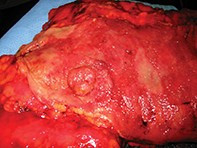Peer Reviewed
Gastroenterology clinic
Cancer surveillance in inflammatory bowel disease
Abstract
Deciding which of the available options is best for managing cancer risk in a patient with inflammatory bowel disease depends on the individual patient’s cancer risk.
Key Points
Who is at risk?
Clinicians and patients are well aware of an association between colorectal cancer and ulcerative colitis. This risk mostly applies to patients with longstanding, active disease that affects the entire colon, and those with coexisting primary sclerosing cholangitis or a family history of bowel cancer. Patients with left-sided colitis have a slightly increased risk of malignancy, but to a lesser extent than those with total colitis. In contrast, patients with proctitis or proctosigmoiditis have colorectal cancer rates similar to the general population. Evidence regarding the cancer incidence in Crohn’s disease is less clear-cut, but individuals with extensive, active Crohn’s colitis do appear to be at increased risk of colorectal carcinoma.
Purchase the PDF version of this article
Already a subscriber? Login here.

